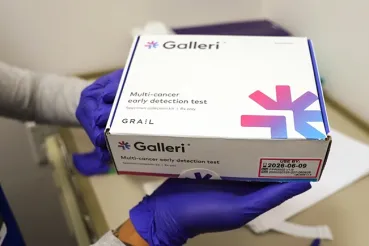Historically, scientists have designed medical treatments for what they consider to be the typical person with a disease. As a result, certain treatments can be very successful for a lot of people but may not always be the best for others.
Today, there’s an increasing focus on a more personal approach to treating diseases. This approach — called precision medicine — is redefining patient care. Precision medicine zeroes in on individual differences in people’s genes, lifestyles and environments. Then it tailors treatments to match those differences.
Rush is putting precision medicine into practice in several areas, including the following three.
1. All of Us: precision medicine research
Clinicians and researchers know that certain drugs often work well for treating certain diseases or conditions. For instance, diuretics (water pills) can help people with high blood pressure and insulin can help people with diabetes.
"But there's a large gap between what we know about treating groups of people with these broad-brush treatments and treating an individual patient sitting across from me in my office," says Raj C. Shah, MD, a researcher and family medicine physician at Rush University Medical Center. "What works for most people may not work for my patient."
To help clinicians personalize treatments, the National Institutes of Health (NIH) has launched the All of Us Research Program. It's the largest effort ever to advance precision medicine and more effectively treat — and even prevent — both common and rare diseases.
The NIH is planning to recruit 1 million or more people nationwide — from all socioeconomic, racial and ethnic backgrounds — to help with this effort. Rush is one of 14 Illinois health care organizations participating in the program and is doing its part by working with thousands of Illinois adults. Shah is a principal investigator for the program at Rush.
Volunteer participants will share information about their health, their lifestyle choices, and the environments where they live and work. And they may be asked to provide a blood sample for genetic analysis. All this information will be protected with strict security safeguards.
Data on this scale can help researchers understand the many individual factors that influence the different ways people respond to treatment.
"And this knowledge will help us find the right treatment for the right patient at the right time," Shah says.
Sign up to be part of All of Us
If you live in the Chicago area and are interested in participating in the All of Us program, or want more information:
- Send email to allofus@rush.edu
- Call (866) 761-7806
- Visit us at 1750 W. Harrison St., Suite 1000, Monday - Friday, 8:30 a.m. - 4:30 p.m.
2. Precision medicine in cancer care
Effective treatments are available for many types of cancer, but they don't always work for everyone.
For example, people who have skin cancer caused by a defective BRAF gene typically respond well to drugs that target that gene. But those drugs — called BRAF inhibitors — don't work for people who have colorectal cancer caused by the same genetic mutation. And researchers don't yet know why.
In the hopes of helping people with cancers that don't respond to known treatments, Rush has begun offering gene analysis to some cancer patients through our precision oncology program. The goal is to find treatments that can target specific mutations in cancer cells — those mutations people are born with and those that happen by chance.
By year's end, as many as 700 patients with solid tumors — including sarcomas, carcinomas and lymphomas — are expected to take advantage of this analysis, which Rush offers in partnership with the tech startup Tempus.
The analysis, called genome sequencing, lets doctors see what variations in genes might fuel a tumor's growth.
Tempus compares each patient's genetic information — taken from blood and tissue samples — with the company's database of up to 1,700 genes linked to cancer. That analysis can help uncover patterns that can save lives.
"Tempus tells us what drugs similar patients have been treated with and how similar patients have done based on national clinical trials and Tempus' own data," says Robert DeCresce, MD, acting director of the Rush University Cancer Center.
Tempus sends all of these results to Rush doctors, who use it to guide cancer treatments
This knowledge will help us find the right treatment for the right patient at the right time.
3. Precision medicine in heart care
Not so long ago, heart problems were often blamed on poor lifestyle choices, such as smoking or eating unhealthy foods. But now doctors know that variations in genes can also predispose people to heart disease and blood vessel problems.
Clinicians at the Rush Heart Center for Women offer tests that can show patients with heart and vascular problems if their genes raise their risk of heart disease, heart attack or stroke.
"Genetic testing can help identify people whose risk for cardiovascular problems is above and beyond traditional risk factors like high blood pressure or high cholesterol," says Annabelle Volgman, MD, the director of the Rush Heart Center for Women.
What these tests reveal can shape treatment and lead to more personalized care.
"We often suggest that women 65 and older should take baby aspirin to protect against heart attacks," Volgman explains. "But if testing uncovers a raised risk of heart disease, we can recommend taking a daily aspirin at an earlier age — or even cholesterol-lowering drugs."
Genetic testing isn't right for every patient with heart problems. But it may be useful for some people with symptoms that don't have a clear cause (such as unexplained chest pain) or with a family history of early heart disease. These risk factors may point to a genetic risk, which a test could uncover.
What's the next step for a woman who finds out she has a genetic risk?
"My role is to help her understand the results of her test," says Carolyn Jones, MD, PhD, a clinical geneticist at the Rush Heart Center for Women. "With that knowledge, she can work with her doctor to make sound choices about how to treat and manage her disease."




